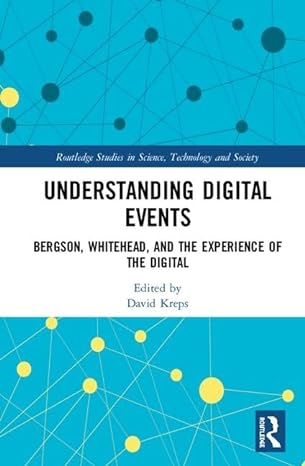
Understanding Digital Events: an events-based approach
It’s with great excitement that the book featuring the Understanding Digital Events study has now been released. During 2018 I worked as Research Associate on a longitudinal study, funded by the British Academy, on the ways in which digital interactions differ between younger and older people.
This new book, Understanding Digital Events: Bergson, Whitehead, and the Experience of the Digital, is published by Routledge. David Kreps, Principal Investigator, brings together a collection of essays from various scholars, each contributing a unique perspective on the nature of digital events. As one of the contributors, I am thrilled to share insights from our journey in creating this volume.

Kreps, D. (ed.) (2019) Understanding Digital Events: Bergson, Whitehead, and the Experience of the Digital. London: Routledge. ISBN 9780367144463
The Genesis of the Book
The book is based on the Understanding Digital Events Colloquium held in MediaCityUK, Salford in June 2018. Hosted by David Kreps, this gathering of minds aimed to delve into the philosophical underpinnings of digital experiences. The discussions were invigorating, and it quickly became apparent that a multi-disciplinary approach is required to understand the individual interactions of users. Our collective insights from both the research studies and colloquium discourse formed the foundation for what would become this book.
Philosophical Foundations
The book is anchored in the event-ontologies of Henri Bergson and Alfred North Whitehead. Bergson’s process philosophy and Whitehead’s concept of events as the fundamental units of reality provide a rich theoretical framework. These philosophies challenge traditional notions of static being and instead propose a dynamic, ever-evolving reality. In the context of digital events, this perspective is particularly illuminating.
Digital experiences are not mere sequences of actions and reactions; they are complex, integrated events that encompass both subjective and objective realities. This dual aspect is crucial in understanding how digital events unfold and influence our lives. By exploring these ideas, we aim to provide a more nuanced understanding of digital phenomena.
Contributors
The book is structured into several chapters, each contributing a unique perspective:
1. Technology, Narrative, and Performance in the Social Theatre by Mark Coeckelbergh explores how digital technology influences our narratives and social performances. Coeckelbergh delves into the performative aspect of digital interactions, highlighting the interplay between technology and human expression.
2. Event and Mind: An Expanded Bergsonian Perspective by Yasushi Hirai expands on Bergson’s ideas to explore the cognitive dimensions of digital events. Hirai argues that our mental engagement with digital events shapes our perception and understanding of reality.
3. Digital Events and the Ethics of Neuro-ICT by Bernd Stahl examines the ethical implications of neuro-information and communication technologies. Stahl raises important questions about privacy, consent, and the moral responsibilities of technology developers and users.
4. Experiencing Reality Alive: Bergson and Whitehead on Engaged Experience by Tina Röck brings a comparative analysis of Bergson and Whitehead’s philosophies. Röck argues that digital events can be seen as moments of 'engaged experience,' where the boundaries between the physical and the virtual blur.
These chapters provide a comprehensive examination of digital events from multiple angles. Each contribution enriches our understanding and opens new avenues for further exploration.
A New Approach to Digital Experiences
One of the key themes of the book is the integration of subjective and objective aspects of digital events. Traditional approaches often treat digital interactions as either purely technical processes or purely psychological experiences. However, our book argues for a more integrated approach.
Digital events are slabs of existence, temporally defined and encompassing both the physical-chemical processes and personal subjective experiences. This holistic view allows us to appreciate the full complexity of digital phenomena. It urges scholars and practitioners to consider both the tangible and intangible aspects of digital interactions.
Practical Implications
The insights from this book have practical implications for the design and development of digital technologies. Understanding digital events as holistic phenomena can inform better user experience design, more ethical technology development, and more effective digital communication strategies.
For instance, recognizing the performative nature of digital interactions can help designers create more engaging and intuitive interfaces. Considering the cognitive dimensions of digital events can lead to technologies that better support mental well-being and cognitive functioning. Addressing the ethical implications of neuro-ICT can guide policymakers in creating regulations that protect users' rights and well-being.
Personal Reflections
As Research Associate and contributor to the colloquium, I am delighted to see the synthesised discourse published in a single publication. The insights gained through the research study will help shape future research into Digital Events, providing a unique perspective into the everyday technological interactions in our modern world.
